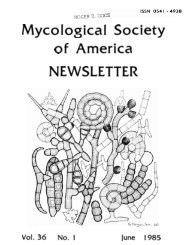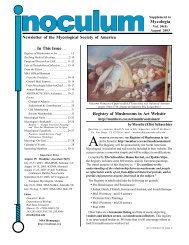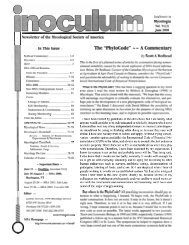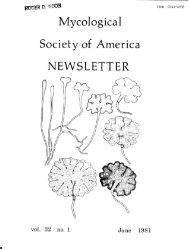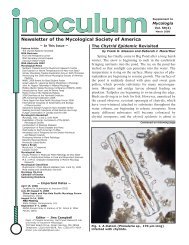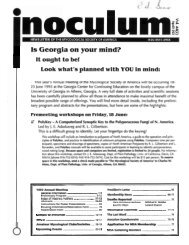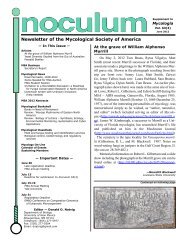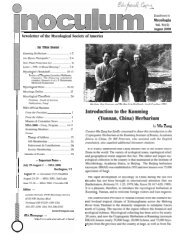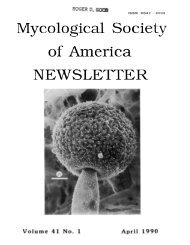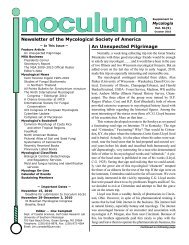0 - Mycological Society of America
0 - Mycological Society of America
0 - Mycological Society of America
Create successful ePaper yourself
Turn your PDF publications into a flip-book with our unique Google optimized e-Paper software.
definitive strategies to compete with ecologists, plant pathologists, plant physiologists and<br />
others. I w ill list six strategies which I believe mycologists can use to further the study<br />
<strong>of</strong> mycorrhizal fungi and to further the field <strong>of</strong> mycology in general.<br />
The first, and an area which mycologists are presently opening up, is the need to under-<br />
stand the effects <strong>of</strong> differing fungal taxa on the host plant. We know that there is no single<br />
"mycorrhizal response. " Different mycorrhi zal fungi differ in their environmental require-<br />
ments, response to perturbation, and effects on the host plant. Some associations may shift<br />
to detrimental responses to the host under different conditions. By understanding the tax-<br />
onomy <strong>of</strong> mycorrhizal fungi and the niches <strong>of</strong> each taxon, mycologists can rapidly exploit the<br />
need for research in this area.<br />
The second strategy fungal ecologists can use to' promote mycological research is to bor-<br />
row perspectives from other groups. One example we are using is from the animal ecologists.<br />
We propose that the importance <strong>of</strong> mycorrhizae in ecosystems far outweighs their biomass or<br />
energy requirements ; they regulate many ecosys tern processes such as succession, plant per-<br />
sistence, and grazing patterns. Using such an experimental approach, e.g. attaching an im-<br />
portance value to mycorrhi zae, has benefits to both applied and basic research.<br />
The third strategy is to promote study <strong>of</strong> mycorrhizal fungi physiology. There are nu-<br />
merous good fungal physiologists but few are working with mycorrhizal fungi. Transfer <strong>of</strong><br />
some <strong>of</strong> this talent to work on such areas as germination and growth <strong>of</strong> VAM fungi and fungal<br />
nutrient transport mechanisms will generate a major interest in agribusiness and would en-<br />
hance funding for training <strong>of</strong> future mycologists.<br />
The fourth area <strong>of</strong> emphasis should be on education, particularly <strong>of</strong> our colleagues. I<br />
recently heard a lecturer discuss "saprophytic" plants. As we well know, these plants do not<br />
live on decaying organic matter but derive much if not most <strong>of</strong> their nutritional requirements<br />
from their fungal associates. We must also educate reviewers and editors <strong>of</strong> granting agencies<br />
and journals from other disciplines. A colleague <strong>of</strong> mine recently had a paper rejected from<br />
an ecology journal because it was "mycology in the guise <strong>of</strong> ecology. " Fungi have physiologies,<br />
ecologies, and systematics just as any other kingdom.<br />
Fifth, mycologists must quit doing "golly-gee whiz" mycology; surveys or studies to see<br />
what organisms are present with no theoretical base. We must assess specific testable hy-<br />
potheses. Mycologists must test (and discredit ungrounded) current ecological , physiological<br />
and systematic theories from other fast-paced fields. With mycorrhizae in particular, mycol-<br />
ogists are in a unique position; we must not only test other theories, but we should be<br />
creating those theories.<br />
Finally, mycologists must be more than mycologists; we must become complete scientists.<br />
Most mycology pr<strong>of</strong>essors produce more students than their own rep1 acement requires. Our<br />
students must be competitors as microbi 01 ogists , ecologists and physiologists . Moreover, we<br />
must not just persuade department heads, deans and vice-presidents to hire mycologists, we<br />
must become the department heads, deans, and vice-presidents in academia, government and in-<br />
dustry. I listened to much <strong>of</strong> the AIBS symposium on "Holistic Approaches to Description and<br />
Management <strong>of</strong> Stressed Ecosystems," an interdisciplinary discussion <strong>of</strong> how to deal with dis-<br />
turbances and stresses. I did not see any other mycologists there despite the fact that a<br />
number <strong>of</strong> mycologists are working on disturbances such as clear-cuts and mine reclamation.<br />
There were no mycologists preparing to take a lead role in the theory or decisionmaking <strong>of</strong> a<br />
newly developing discipline in which fungi are a major component.<br />
It is only by understanding other disciplines and competing for positions, grants, and,<br />
<strong>of</strong>ten, academic recngni tion that mycology wi 11 be regarded as viable scientific discipline.<br />
The alternative is stagnation and a perception as eccentrics who retain a few academic positions<br />
and pub1 ish minute descriptions <strong>of</strong> "1 i ttle plants" in their own obscure journals.<br />
Mycology then wi 11 be done by microbiologists, ecologists, physiologists or not at a1 1.<br />
Michael F. Allen



